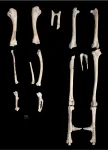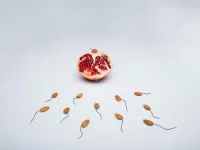INFORMATION:
The research was carried out by Sean Doherty, Caroline Skelton, Rebecca Smallman, and Naomi Sykes from the University of Exeter; Alison Foster; Peta Sadler; Julia Best from the University of Cardiff and Bournemouth University, Sheila Hamilton Dyer from Bournemouth University; James Morris from the University of Central Lancashire; Helina Woldekiros from Washington University in St. Louis and Richard Thomas from the University of Leicester.
This study, Estimating the age of domestic fowl (Gallus gallus domesticus L. 1758) cockerels through spur development, is published in the International Journal of Osteoarchaeology. https://doi.org/10.1002/oa.2988.
Ancient chickens lived significantly longer than modern fowl because they were seen as sacred, not food -- study shows
2021-06-07
(Press-News.org) Ancient chickens lived significantly longer than their modern equivalents because they were seen as sacred - not food - archaeologists have found.
Experts have developed the first reliable method of finding the age of fowl who lived thousands of years ago. Their research shows they lived to advanced ages, and were kept for ritual sacrifice or cockfighting rather than meat or egg production.
Chickens today live for a few weeks (in the UK poultry birds live for between 33 and 81 days), but during the Iron Age, Roman and Saxon period they lived up to the age of two, three or even four years old.
Calculating the age of bird remains is hard because techniques used for mammals, such as bone fusion and tooth wear, are not available. Researchers have devised a new method based on size of the tarsometatarsal spur which develops on the leg of adult cockerels.
The new method was tested on modern birds of known-age and then applied to ancient specimens. This has allowed the experts to reconstruct the demographics of domestic fowl from Iron Age to Early Modern sites in Britain to reveal changes in relationships between humans and fowl.
Of the 123 Iron Age, Roman and Saxon bones analysed, over 50 per cent were of chickens aged over two years, and around 25 per cent over three years.
Dr Sean Doherty, from the University of Exeter, who led the study, said: "Domestic fowl were introduced in the Iron Age and likely held a special status, where they were viewed as sacred rather than as food. Most chicken bones show no evidence for butchery, and were buried as complete skeletons rather than with other food waste"
"The study confirms the special status of these rare and highly prized birds, showing that from the Iron Age to Saxon period they were surviving well past sexual maturity. Most lived beyond a year, with many reaching the age of two, three and four years old. The age of which cockerels then started to die at becomes younger after this period."
Experts carried out analysis on modern leg bones from domestic fowl and red jungle fowl of known age and sex from multiple collections. This revealed that the bony spur only develops in older birds.
Of the 69 cockerels aged below 1 year, only 14 (20 per cent) had developed a spur. The only age in which all cockerels had a spur was those aged over 6 years. Consequently, there is the potential for archaeologists to misidentify young cockerels without a spur as hens.
Once fully developed, the spur increases in size and its length in relation to the length of the leg can be used to estimate age.
The researchers also took measurements from 1,368 domestic fowl leg bones from British sites dating from the Iron Age to modern period to reconstruct the age when they had died and their sex. This suggested during the Iron Age and Roman period there were significantly more cockerels than hens, likely due to the popularity of cockfighting in this period.
ELSE PRESS RELEASES FROM THIS DATE:
UEFA EURO forecast: France will be European Champion
2021-06-07
On Friday, 11 June, Europe's men's football teams will start the European Championship a year later than planned. The favourite this time is France with a probability of winning of 14.8 per cent. This is what an international team of researchers consisting of Andreas Groll and Franziska Popp (both TU Dortmund, Germany), Gunther Schauberger (TU Munich, Germany), Christophe Ley and Hans Van Eetvelde (both Ghent University, Belgium), Achim Zeileis (University of Innsbruck, Austria) and Lars Hvattum (Molde University College, Norway) has shown with the help of machine learning. Their forecast combines several statistical models for ...
Nobody's been studying socially isolated kids -- that's a problem
2021-06-07
For years, psychology researchers have treated peer rejection and social network isolation as being somewhat interchangeable when it comes to early adolescence; it was thought that if kids fell into one of those two groups, they fell into the other. A recent study finds there is actually little overlap between the groups - and socially isolated kids face different risks.
"Broadly speaking, there are two types of socially marginalized groups in early adolescence," says Kate Norwalk, lead author of the study and an assistant professor of psychology at North Carolina State University. "There are kids who face peer rejection, meaning they are disliked by other kids; and there are kids who are experiencing social network isolation, meaning they don't have a ...
Societal divisions could hinder EU climate policy
2021-06-07
Many contemporary political conflicts are between those who would prioritize the needs of local or national communities and those with a more universal outlook. According to a new study by IASS researcher Silvia Weko, this split between "communitarian" and "cosmopolitan" Europeans is also evident in their attitudes towards European climate policy. Achieving climate neutrality without exacerbating societal divisions within and between countries will require the EU to strike a careful balance.
In political philosophy cosmopolitans and communitarians are frequently characterized as "winners" and "losers" of globalization. ...
Lighting up ultrafast magnetism in a metal oxide
2021-06-07
UPTON, NY--What happens when very short pulses of laser light strike a magnetic material? A large international collaboration led by the U.S. Department of Energy's (DOE) Brookhaven National Laboratory set out to answer this very question. As they just reported in the Proceedings of the National Academy of Sciences, the laser suppressed magnetic order across the entire material for several picoseconds, or trillionths of a second. Understanding how magnetic correlations change on ultrafast timescales is the first step in being able to control magnetism in application-oriented ways. For example, with such control, we may be able to more quickly write data to memory devices or enhance superconductivity ...
Improved method for generating synthetic data solves major privacy issues in research
2021-06-07
The lack of data is a major bottleneck for many kinds of research, and especially for the development of better medical treatments and drugs. This data is extremely sensitive and, understandably, people and companies alike are often unwilling to share their information with others.
Researchers at the Finnish Center for Artificial Intelligence have developed a machine learning-based method that produces synthetic data on the basis of original data sets, making it possible for researchers to share their data with one other. This could solve the ongoing problem of data scarcity in medical research and other fields where information is sensitive.
The generated data preserves privacy, remaining similar enough to the original data to be used for statistical ...
Researchers test an algorithm that could predict heart attacks in young people
2021-06-07
Researchers at Queen Mary University of London have tested an algorithm on 700,000 patient records in east London, to find out if the data routinely collected by GPs can reveal cases of Familial Hypercholesterolemia - a leading cause of heart attack in young people.
Familial Hypercholesterolemia (FH) is a condition passed down through families that causes extremely high levels of cholesterol in the blood. Without treatment, it can lead to a heart attack at a very young age. FH affects 320,000 people in the UK, the vast majority of whom are unaware they have it.
One method of detection is the 'FAMCAT' (Familial Hypercholesterolemia Case Assertation Tool) which analyses data in GP records - including ...
Odds of stem cell transplant restoring fertility are as random as a coin toss -- until now
2021-06-07
The ability of stem cells to fix impaired functions of host tissues after transplantation has been a lifesaving breakthrough in treating previously incurable conditions. Much like a coin toss, however, the fate of the transplanted stem cells is unpredictable. They may choose self-renewal, grow into a different kind of tissue, or die.
Spermatogonial stem cells follow the same stochastic fate of unpredictability in outcomes. But a group of fertility scientists led by Hiroshima University's Yoshiaki Nakamura discovered a new method that has favorably flipped the odds and successfully reversed male infertility in mice -- showing great promise for future applications in regenerating human sperm after cancer treatment ...
A high concentration of ACE2 in the blood may increase the risk of serious COVID-19
2021-06-07
Normally, the ACE2 enzyme helps regulate our blood pressure. The enzyme sits on the surface of cells, including cells in the lungs, but in connection with COVID-19 it has been found that ACE2 also functions as a gateway for the virus.
"Different viruses have different ways of accessing our cells - as the virus must, of course, get into the cell to be able to replicate, and the coronavirus uses ACE2 to gain access. For this reason, we're investigating what the concentration of ACE2 means for the course of the disease, if you get COVID-19," explains MD and PhD Tue Wenzel Kragstrup from the Department of Biomedicine at Aarhus University. The preliminary results have just been published in the scientific journal PLOS ONE.
As mentioned, ACE2 is part of the surface of the cells, but ...
Puerto Rico is prone to more flooding than the island is prepared to handle
2021-06-07
AUSTIN, Texas -- Puerto Rico is not ready for another hurricane season, let alone the effects of climate change, according to a new study that shows the island's outstanding capacity to produce record-breaking floods and trigger a large number of landslides.
The latest research, appearing in the journal END ...
Innovative batteries put flying cars on the horizon
2021-06-07
Jet packs, robot maids and flying cars were all promises for the 21st century. We got mechanized, autonomous vacuum cleaners instead. Now a team of Penn State researchers are exploring the requirements for electric vertical takeoff and landing (eVTOL) vehicles and designing and testing potential battery power sources.
"I think flying cars have the potential to eliminate a lot of time and increase productivity and open the sky corridors to transportation," said Chao-Yang Wang, holder of the William E. Diefender Chair of Mechanical Engineering and director of the Electrochemical Engine Center, Penn State. "But electric vertical takeoff and landing vehicles are very challenging technology for the batteries."
The researchers define the technical requirements ...




